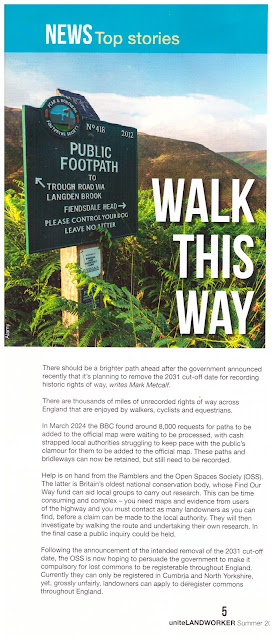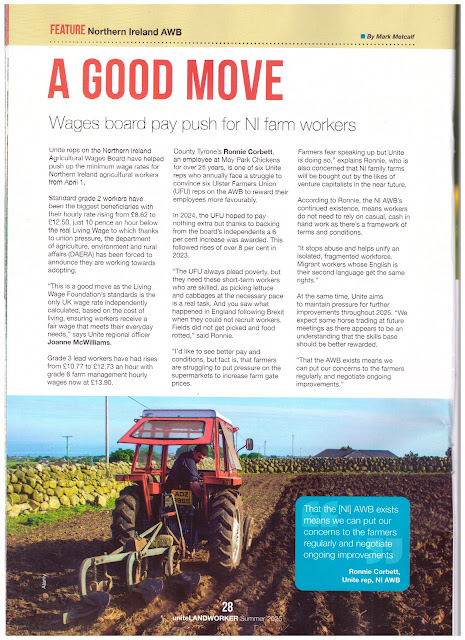OUR LAND IS FOR GROWING ON
uniteLANDWORKER Summer 2025
The government’s ‘Our Vision for land use in England’ consultation document on food security, economic expansion and the environment has the potential to increase ‘green’ jobs and boost employment in the smaller agricultural machinery suppliers market, says soil scientist and Unite campaigner Dr Charlie Clutterbuck – but only if it aims to target increased food production at home
With the Britain set to be battered by prevailing trade
winds, Charlie’s new website reveals how unproductive plots of land across the
Western Pennines could be recultivated. It is a programme that could be
developed nationwide - especially as under 1% of land is used for horticulture,
largely growing fruits and vegetables.
This being overlooked under the ‘Our Vision’ consultation as
each of the targets talked about are to do with the environment - e.g. trees,
water, carbon & biodiversity.
But there are no targets for food.
This follows the last government’s prioritising of carbon
offsetting, resulting in increasing number of businesses, including many from
the City of London such as Standard Life and Aviva, buying productive
farmland and planting trees to profit from subsidies for ‘homegrown carbon
credits.’ Large landowners are following suit.
“Today, I hear local business people say that they prefer to
buy carbon credits. Worryingly, not so for food,” states Clutterbuck.
England is a mosaic of different land uses, with two thirds
of its area (67%) being agricultural while built-up areas take up 11% of land.
Charlie’s site is at https://sites.google.com/site/lookattheland/home/land-use-in-england
It is a virtual tour showing land use in the Western
Pennines is changeable. Charlie knows as he once farmed there. It is not an
easy task.
GPs can be employed by walkers on the 14 walking stages
outlined stretching from Ilkley, via Hebden Bridge and Burnley, on to Pendle
where the Witches perished for challenging the local landowners who evicted
them from their farms.
Land reflects a lot of history, much of it about power and
struggle.
GPS can be employed by walkers for accuracy.
Charlie’s aim “is to reveal how land may have looked in
previous times, thus helping decide future patterns. We need to question how we
could run the land better - both for people and the planet. Much needs
changing.”
The rewards though could be substantial. “By cutting our
food imports, much of which is ultra-processed, from the current 50% we’d
reduce travel miles, slicing our CO2 emissions.
“The current £5 billion countryside land-based subsidies
should be concentrated on aiding smaller scale food production, thus increasing
rural jobs and boosting demand for smaller farm machinery from companies
manufacturing them. It is a win-win situation,” contends Clutterbuck.
Charlie’s site on land use: https://bit.ly/3HzoY84





